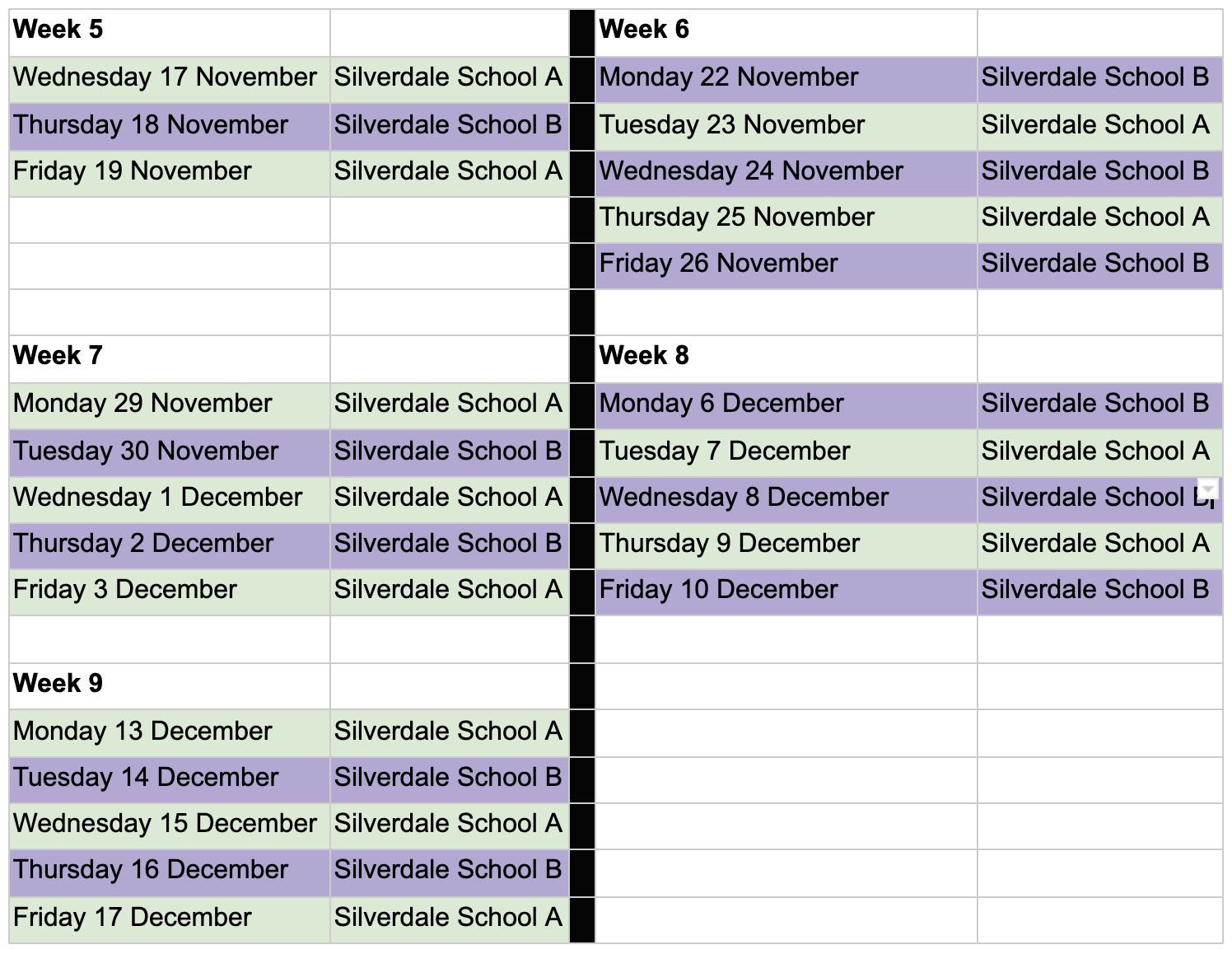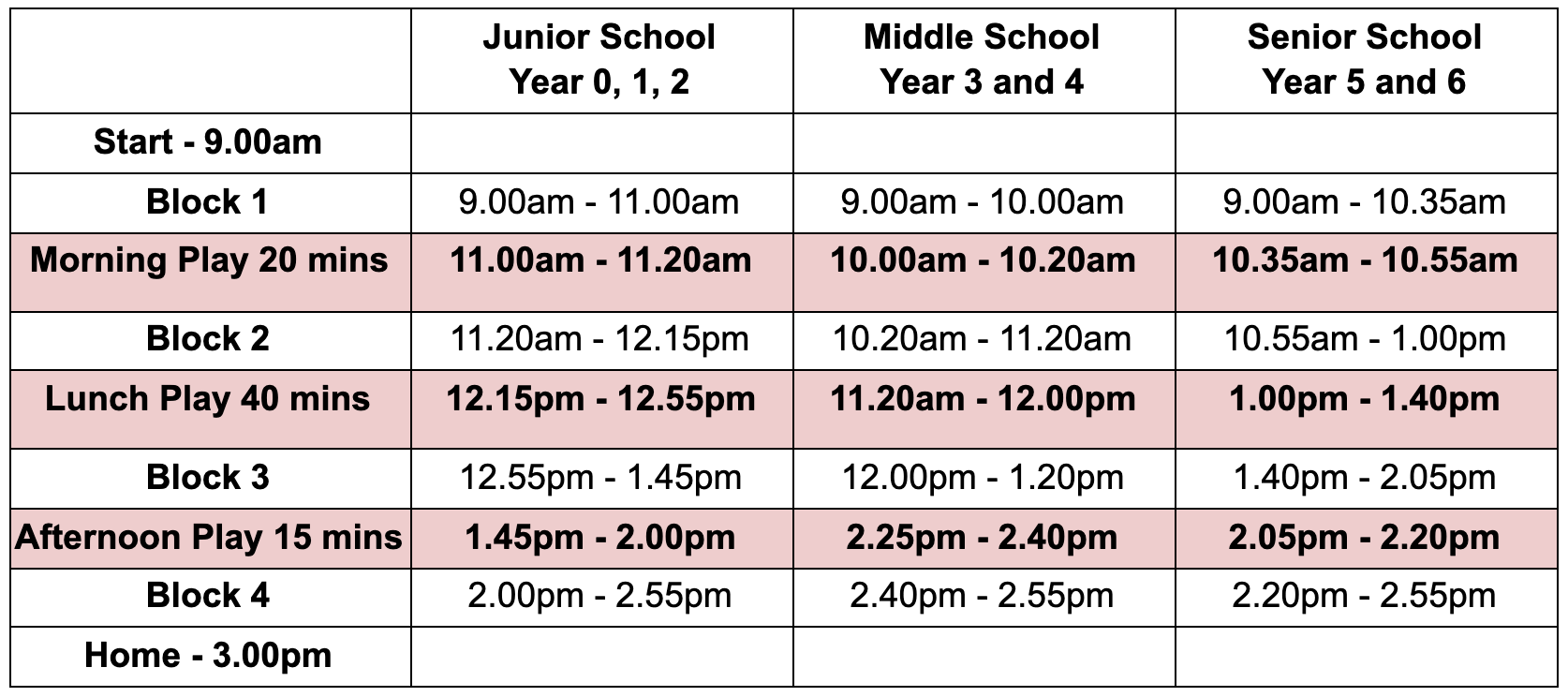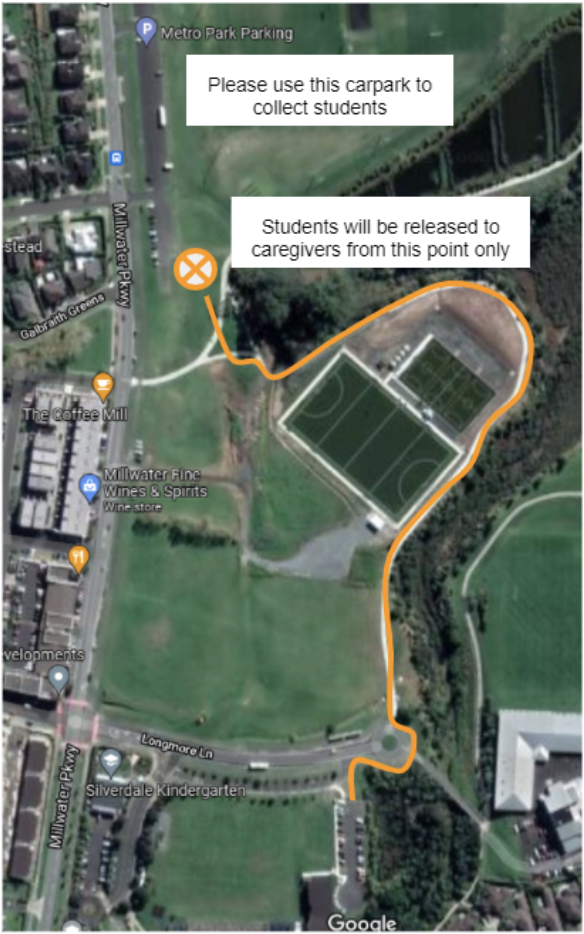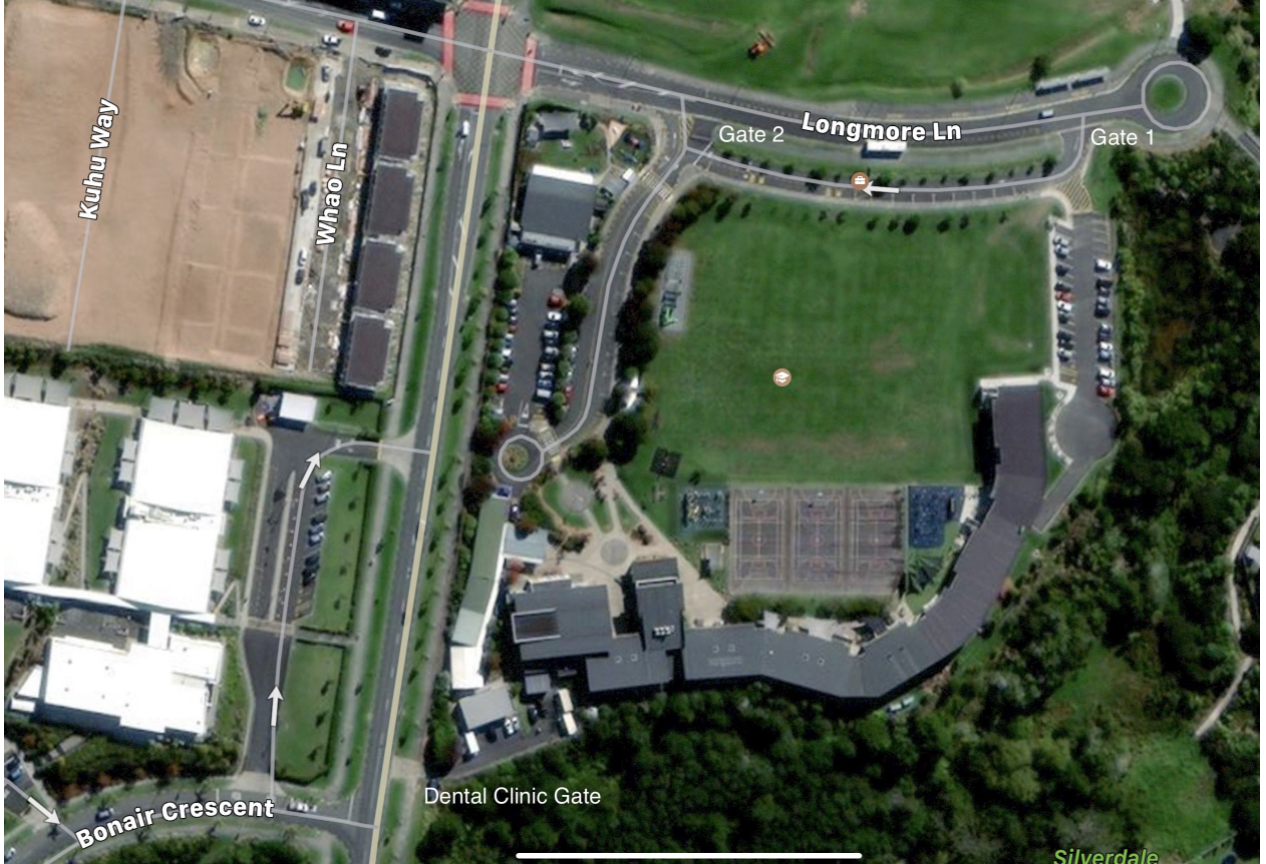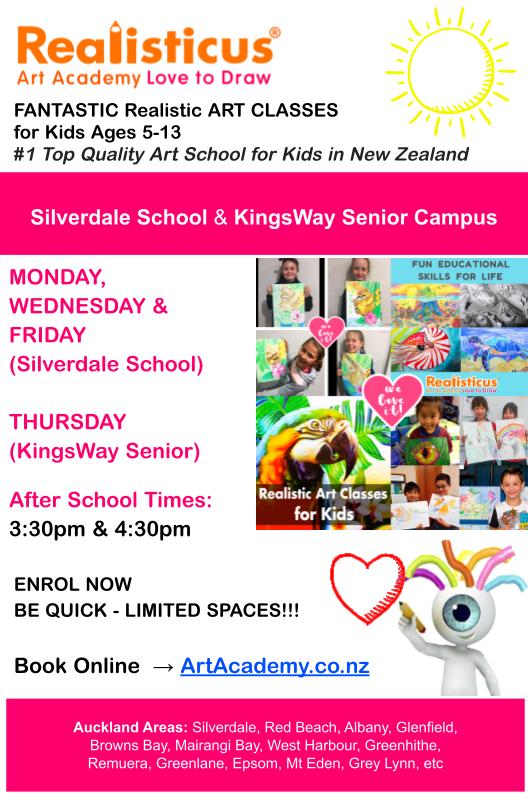Wednesday 17 November
Kia ora, Talofa, Malo e leleli, Kia orana, Fakalofa lahi Atu, Taloha Ni, Ni sa bula, 你好, Namaste, 안녕하세요, Hola, Xin chao.
|
Welcome
Welcome to Harper Barrows who started with us this week. Our current roll is 899.
Happy Birthday
Happy birthday to Sean Collins, Samuel West, Armaan Mann, Ella Bryce, Daio Coleman, Elaine Wang, Ruby Connolly, Archie Connolly, Leah O’Reilly, Nathan Baker, Ellie Ngor, Kreeli Panchal, William Kim, Fuzion Stevens, Noelle Deviatova, Erin Gardener, Hayk Ford and Lynda O’Donnell.
Reopening of School
It was fantastic to see children back at school today. It was so nice to hear their laughter, their enjoyment of catching up with their friends and teacher. The first day back has gone smoothly and I thank you all for that. Thank you for your months of remote learning. Thank you for being flexible. Thank you for being kind and caring. We now face a different challenge. Teaching and learning with Covid-19 in our communities. We have strong health and safety procedures in place for our staff, children and community. This is all new to us and we will continue to monitor and review our procedures. Together we will support each other and make this the best possible experience for everyone.
|
|
|
|
|
Visitors to School
All visitors to school will have to wear a mask, report to the office to sign in using the Covid Tracer App. If visitors can’t use the Covid Tracer App then visitors will complete the “Record Keeping Slip” and place it in the box.
Pick Ups at Metro Park Carpark by the cricket nets for Children/tamariki in Team Tūī
For Team Tūī children/tamariki who are being picked up from Metro Park Carpark by the cricket nets, teachers will walk them down to Metro Park Car park by the cricket nets. The children/tamariki who aren’t being picked up from Metro Park (the ones who bike, scooter or have pre-arranged pick up points off site not at Metro Park) will be supervised by their classroom teacher and dismissed at 3pm to go home.
Pickups can be made via the car or on foot. Parents/caregivers/whānau picking their children/tamariki up in the car will wait in the car and the children/tamariki will go to the car. Parents/caregivers/whānau waiting at Metro Park Carpark by the cricket nets will maintain social distancing of 2m. Students will only be released to caregivers/whānau from the cricket nets, not en route.
Team Tūī children/tamariki who have younger siblings will go to the classroom and collect their younger siblings in time to all walk down to Metro Park together with the teachers and the rest of Team Tūī.
|
|
|
Pick Up and Drop Off of Students
Drop off in the morning.
- Parents/caregivers/whānau are not to come on-site unless it’s an emergency.
- The school gates will be closed until 8.30am. Please do not send your child to school to wait at the gate before 8.30am.
- Parents/caregivers/whānau who are dropping off children/tamariki in their cars will use the stop, drop and go area and not get out of their car.
- No one will be allowed on site before 8.30am.
- At the 8.30am bell students will be allowed on site and they must go straight to their classroom.
- Parents who have walked, biked, scootered with their children/tamariki will drop them off at the gate and not come on into school. There will be three entry points for children/tamariki on foot or wheels to enter the school from, Gate 1, Gate 2 and the gate by the dental clinic. (Please see map). Parents waiting at the gates will maintain social distancing of 2m.
- There will be two staff members at each gate to support any child who needs support to get to their classroom.
- Children/tamariki who catch the bus, the bus will drop off the children/tamariki at school as per normal before the lock down.
|
|
|
Pick up in the afternoon.
- Parents/caregivers/whānau are not to come on-site unless it’s an emergency.
- Parents/caregivers/whānau will wait at the gate they dropped their children/tamariki off in the morning. Parents waiting at the gate will maintain social distancing of 2m.
- Children/tamariki who have walked, biked or scootered to school will be released from their classroom at 3.00pm as per normal and walk straight to the same gate as they were dropped off in the morning.
- Team Tūī will be walking to Metro Park to be picked up by parents/caregivers/whānau in cars or on foot. If the children/tamariki have a younger sibling they will collect their younger sibling from their class and walk them to Metro Park. Students will only be released to caregivers/whānau from the cricket nets, not en route.
- If parents/caregivers/whānau have a pre-arranged pick up point that is off site, these children/tamariki will be dismissed from school at 3.00pm and will go straight to the pre-arranged pick up point.
- Bus children/tamariki will be walked to the bus by a staff member.
- Any changes to pickups will need to be communicated to the Office by 2.00pm.
Three ways to foster a growth mindset in our children
- Use encouragement.
The message we send in response to our children’s efforts is going to have the highest impact on their likelihood for success. Contrary to popular belief, encouragement is NOT praise. It is an acknowledgement without judgment.
Praise focuses on what is believed to be their natural talents or traits and can sound like, “ You did so well, you are so smart,” “You are a natural,” or, “Wow, your netball skills are amazing!”
Instead focus on the process or effort: “Wow, it looks like you worked really hard on that project,” “I noticed that you really take on a challenge, even when things are difficult,” or, “Have you noticed the improvement in your writing since you have focussed of using describing words?” Focusing your energy and attention on the effort and/or process will lead to success.
- Respond to setbacks as opportunities for learning and improvement
“Mistakes are simply opportunities for learning.” How we respond to our children’s failures, setbacks and challenges will be one of the key factors in their future success. These responses might sound like: “It sounds like you are disappointed with your result on the maths test. What do you think you could have done differently to prepare?” Or “I noticed you are really frustrated trying to get all your homework completed on time. Are there any strategies that I can help you with that would allow you to get it done in a more timely manner?” Or simply “What might you do different next time?”
This is a perfect opportunity to coach children to come up with their own solutions or ask them if they would like assistance in coming up with a plan for themselves.
- Modeling a growth mindset as a parent
Even as adults we are still learning, growing and making mistakes. It is imperative that we share and model our own process with our children. Share with your children challenges you are having or setbacks you have experienced and some of the things you have done to overcome them. Kids love to hear stories about their parents’ childhood. Share stories about similar challenges you faced as a child.
It might sound like: “I’m just learning how to play tennis as an adult and miss a lot of shots during class. But I am working hard, go to class every week and am asking my coach for tips and can see that I’m getting better every time I practice.”
Having a growth mindset comes easy to some because they grew up with parents or mentors who instilled it, but it is definitely something we can all embrace and practice within our own lives and with our children.
Well Done
Congratulations to former students Amber Bigwood, Jake Birks, Anne Leakey and Gannon Platta-Mills who have been selected to join the Orewa College Prefect team for 2022.
Jake Birks – Community Prefect
Anne Leakey – Academic Perfect
Gannon Platta-Mills – House Perfect
Amber Bigwood – House Perfect
|
Silverdale School Country Show Day Online Auction – The auction is open from Wednesday 10 November until Friday 19 November.
Winner, winner, chicken dinner!
We are so fortunate that local businesses have been super generous in donating items and services to support our school! Get online and get bidding – you might even grab yourself a bargain.
There is something for everyone!!
https://www.32auctions.com/CSD2021
The auction is open from Wednesday 10 November til Friday 19 November.
Winning bidders can then make payments directly into the PTA account (12 3046 023 1780 00) or pay by EFTPOS when collecting on Sunday 21 November at Metro Park.
Reasons to get vaccinated
Without vaccines, we’re at risk of serious illness, disability or even death from things like the measles, meningitis, pneumonia, tetanus and polio – and now COVID-19.
Vaccines work by stimulating the body’s natural resistance by training our immune systems to create antibodies.
Here are a few reasons why vaccinations are good – for everyone:
- they can prevent us from getting sick
- they are safe
- they can save lives
- they will not cause a disease they are designed to prevent
- they can help protect the community
- prevention is much better than treatment.
In a nutshell, by getting vaccinated, we are protecting ourselves, our loved ones and those around us. Most people can be vaccinated, but those who cannot be – including very young babies, those who are seriously ill or have certain allergies – they depend on us to be vaccinated to ensure they are also safe from vaccine-preventable diseases.
These are the reasons the Government is requiring the education workforce to be vaccinated by 1 January 2022.
It’s important to know that licensed vaccines have been rigorously tested across multiple phases before being approved for use.
How does the vaccine work?
The COVID-19 vaccine works by teaching your body to fight the virus and protects you from
getting sick:
- The vaccine sends a set of instructions to teach your body how to fight the COVID-19 virus.
- With these instructions your body learns to recognise the COVID-19 virus and use antibodies against it. Antibodies stop the virus from infecting your cells and help to kill it.
- That means if you come into contact with the COVID-19 virus in the future, your body will have the right tools to protect itself so you are less likely to get sick.
Is the vaccine safe?
The Pfizer vaccine has been thoroughly assessed for safety by our own Medsafe experts.
Medsafe only grants consent for using a vaccine in Aotearoa once they’re satisfied it has met strict standards for safety, efficacy and quality.
This is the same process used to assess other vaccines, like the flu, measles, and tetanus vaccines. There have been no shortcuts taken in granting approval.
The Pfizer vaccine has been used successfully by millions worldwide and is highly effective at preventing severe illness and death. It continues to be monitored for safety.
Why was it developed so quickly?
Because the mRNA vaccine is not new technology and has been studied for over a decade, including for the development of other vaccines such as the seasonal flu vaccine, researchers had a head start.
This is the first time scientists and governments from around the world have united to develop a vaccine. This global collaboration meant they could spend an enormous amount of time and money into developing the vaccines very quickly without taking any shortcuts in the necessary processes or compromising safety. This also meant that the various stages of research development happened at the same time.
Are there any side effects?
It is common to experience mild side effects, such as muscle aches, pain at the injection site or headaches.
These are more commonly reported after the second dose and are actually a sign that your body’s immune system is learning to fight the virus. They don’t last long and won’t stop you from having a second dose or going about your daily life.
There are some side effects that are more serious but very rare, like a severe allergic reaction or an inflammation of the heart. If you develop difficulty breathing, a racing heart, chest pain or feel faint immediately or in the days after the vaccine, you should seek medical attention.
Further information
Here are links to some downloadable PDFs:
The Unite Against COVID-19 website also has content about misinformation and scams which may also be helpful for you and for your community.
If you see something about COVID-19 or the vaccine that doesn’t seem right or if it’s on social media, you can report it to the platform. Anything else can be reported to CERT NZ.
Here is a range of resources available to inform people who are anxious about the vaccine.
Videos
- Nigel Latta, Dr Maia Brewerton and Dr Helen Petousis-Harris recently answered questions in a Facebook live event.
- Dr Ashley Bloomfield, Dr Nikki Turner, Dr Siouxsie Wiles and Dr Vanisi Prescott recently answered questions about the COVID-19 Vaccine, moderated by Mihingarangi Forbes.
- Mihingarangi Forbes sat down with Dr Hinemoa Elder to discuss some key concerns and hesitancies.
- Vax Facts with Māori Doctors: Dr Anthony Jordan, Dr Papaarangi Reid, Dr Rawiri McKree-Jansen, Dr Maia Brewerton (specialists and activists in Māori health) take phone calls from the Public about Covid and the Vaccine. (Most callers are unvaccinated.)
- Clinical psychologist Rachel Prebble explains how to talk to friends and whānau in this video create an opportunity for open, safe conversations which build trust and enable change over time
- A fun and informative item on the Hahana Facebook page with answers to lots of vaccine questions.
- A rangatahi panel with Dr Jason Tuhoe to kōrero about the vaccine from different perspectives (vaccinated, vaccine hesitant, wants to be vaccinated but whānau pressure not to).
- Watch a discussion between four health professionals where they share their thoughts, knowledge and experiences of the COVID vaccine in Straight Up with Dr. Lily Fraser – The Panel.
Articles
|
|
|
|
|
|
|
|
|
|
|
|
|
|
|
Thank you to our Newsletter Sponsors
|
|
|
|
|
|
|
|
|
|
|
|
|
|
|
|
|
|
|
|
|
|
|
|
|
|
|
|
|
|
|
|
|
|

